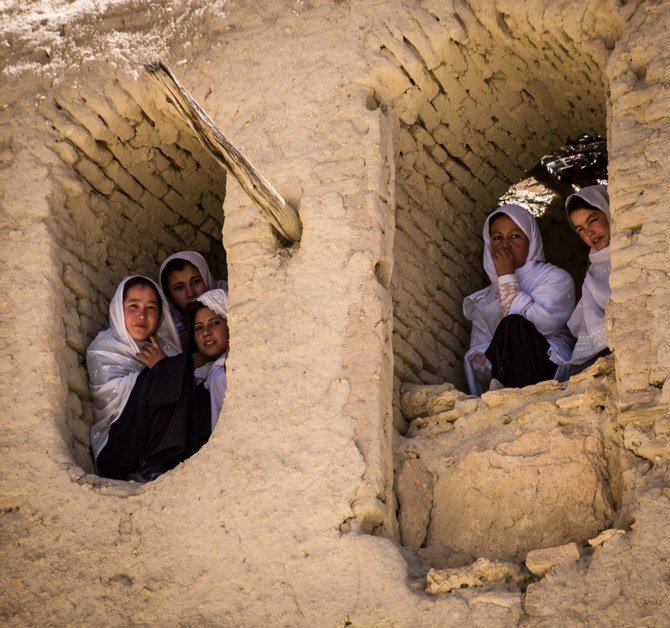KABUL, Afghanistan: Taliban forces unlawfully killed 13 ethnic Hazaras, most of them Afghan soldiers who had surrendered to the insurgents, a prominent rights group said Tuesday.
Meanwhile, the Taliban leadership met with Iranian officials in Kabul in an effort to boost trade relations key to filling cash-starved coffers as the country teeters on the brink of economic collapse. The United Kingdom also sent two envoys to Afghanistan to meet with top Taliban officials, the prime minister’s spokesman said.
The killings took place in the village of Kahor in Daykundi province in central Afghanistan on Aug. 30, according to an investigation by Amnesty International. Eleven of the victims were members of the Afghan national security forces and two were civilians, among them a 17-year-old girl.
The reported killings took place about two weeks after the Taliban took control of Afghanistan in a blitz campaign, culminating in their takeover of Kabul. At the time, Taliban leaders sought to reassure Afghans that they had changed from their previous harsh rule of the country in the late 1990s.
The Taliban met with a delegation from Iran to regulate trade between the countries, Taliban spokesman Bilal Karimi said Tuesday. They agreed to increase trading hours at the Islam Qala border crossing from eight hours per day to 24, better regulate the collection of tariffs and improve roadworks. Customs are a key source of domestic revenue for the country.
The aid-dependent country is grappling with a liquidity crisis as assets remain frozen in the US and disbursements from international organizations that once accounted for 75 percent of state spending have been paused.
Meanwhile in Kabul, the Taliban said Tuesday they arrested 11 members of the Daesh group, a rival and bitter enemy of the insurgents. The Daesh group’s affiliate — based in eastern Nangarhar province — has claimed responsibility for a spate of recent attacks targeting Taliban forces in eastern Afghanistan and elsewhere.
Taliban spokesman Bilal Karimi posted on Twitter that the raid was carried out on Sunday night in the Afghan capital’s Fifth Police District. He provided no further details. The raid came just hours after a bombing that targeted the Eid Gah Mosque in Kabul, killing at least five people.
IS claimed responsibility for the mosque attack late on Monday, saying in a posting on its media arm, the Aamaq news agency, that one of their suicide bombers targeted senior Taliban figures following a mourning service.
Sunday’s bombing was the deadliest attack in Kabul since the Taliban took control of Afghanistan with the chaotic departure of the last US troops on Aug. 31. IS had also claimed responsibility for the horrific bombing on Aug. 26 that killed more than 169 Afghans and 13 US military personnel outside the Kabul airport, where thousands of people were trying to reach the airport to escape Taliban rule.
The world has been watching whether the Taliban would live up to their initial promises of tolerance and inclusiveness toward women and ethnic minorities, among them the Shiite Hazaras. However, Taliban actions so far, such as renewed restrictions on women and the appointment of an all-male government, have been met with dismay by the international community.
Protests against the Taliban’s policies toward women continued, with a demonstration Tuesday in a Kabul private school by female teachers and students who held up signs saying “Education is a right.” The protest was held indoors to avoid backlash from the Taliban, who have recently outlawed demonstrations held without permission from the government.
The UN children’s agency continued to sound the alarm, saying a humanitarian crisis is imminent and warning that half of Afghanistan’s children under age 5 are expected to suffer from severe malnutrition as hunger takes root amid serious food shortages.
“There are millions of people who are going to starve and there is winter coming, COVID raging, and the whole social system collapsed,” said Omar Adbi, UNICEF’s deputy executive director for programs, during a visit to a Kabul children’s hospital.
At the hospital, a woman named Nargis sat with her 3-year-old child who was suffering from severe malnutrition. She had come from Kunar province in northeastern Afghanistan, where fighting between the Taliban and the Daesh group has deprived communities of accessing basic needs, including food. Nargis declined to give her full name.
Amnesty’s secretary general, Agnes Callamard, referring to the killings in Daykundi, said “these cold-blooded executions (of the Hazaras) are further proof that the Taliban are committing the same horrific abuses they were notorious for during their previous rule of Afghanistan.”
Hazaras make up around 9 percent of Afghanistan’s 36 million people. They are often targeted because they are Shiite Muslims in a Sunni-majority country.

